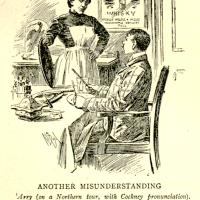It is intriguing what you might find on Twitter….
Last year I was in the midst of a large research project that was tilting forward toward a book. One of the first steps in research is taking a broad look at the landscape of ideas before charting a path forward where the path seems best. While many PhD paths become intensely narrow–like a single otter slide in the Mississippi delta–mine remained remarkably broad. Before I moved on to other things, I spent much of 2021 sharing with A Pilgrim in Narnia readers some of the big picture research discoveries I had made along the way.
As it turns out, my post, “The C.S. Lewis Studies Series: Where It’s Going and How You Can Contribute,” was the culmination of that sharing rather than the beginning of a new season. I simply haven’t been able to keep up that time-intensive project–though that post is a great resource Lewis studies students. And to be frank, “The C.S. Lewis Studies Series” is itself an afterthought name. It began as the the “Good C.S. Lewis Studies Books That Did Not Win the Mythopoeic Award” series!
With its gangly name and my own pivot away from my PhD to other projects, the series has grown and changed, but my impetus to get some of the things I had learned into the world was the same. I had done some background posts over the years, like the chronological reading project, thoughts about the Problem of Susan debate, the “How to Read All of C.S. Lewis’ Essays” post, and some bibliographies, reviews, and resource lists from time to time. But I was provoked in the springtime by the Tolkien studies sweep of the Mythopoeic awards nomination list to think about what might be at the root of what I perceived as a difference between Lewis studies and Tolkien studies projects. In doing this, a reader challenged me to acknowledge where I thought the strengths were in Lewis studies. That began a “Why is Tolkien Scholarship Stronger than Lewis Scholarship?” series, which promed the “Good Books that Didn’t Win” sieries as my own rebuttal–a way of say, “Yeah, but here are some great and useful resources.”
I’ve listed most of the major resource posts in the “Good C.S. Lewis Studies Books That Did Not Win the Mythopoeic Award” note and my most recent update of “A Brace of Tolkien Posts.” I have also added the JRRT vs. CSL and Good CSL Books lists below, for those just joining in.
But here is something new.
Back when I did the Tolkien studies vs. Lewis studies digital cage match, I invited others to join in. Most of that discussion happened in the comments section of A Pilgrim in Narnia, on Facebook groups, and in guest blog posts, like Connor Salter’s essay, “Lewis and Tolkien among American Evangelicals.” It took awhile, but someone else has offered a response on a more theoretical level.
We have met Joe Hoffman before. As a physicist, Joe naturally operates a liberal arts, great books, digital humanities, liberal arts, cultural thought, fencing blog called Idiosophy. It’s probably better to read that title with its Greek etymology than its English nuances, but I’ll leave that up to you. A few years ago, Joe dialogued with my statistical analysis work–I use this blog as a bit of a sandbox for testing out different methods for reading and research. You can see the whole conversation here, “That Hideous Graph: Joe Hoffman Enhances the Data from my C.S. Lewis Writing Schedule Cheatsheet.” I reflected on Joe’s conversations a little bit later here: “Joe Hoffman on Statistical Analysis, and the Future of the Humanities.”
As you can see, my Joe-related blog post titles are anything but elusive.
Well, Joe has struck again, which I found out about on Twitter.
With a gap on only 16 months, Joe was able to successfully cut through my entire CSL Scholars vs. JRRT Scholars with a single theoretical solution: The Idiosopher’s Razor. He also proposes a rather elegant reason why I never thought of it myself.
Find out all about it out at “The secret of a strong field of research.” It offers a level of high-order thinking that I thought was worth sharing. Also, I’ve been eyebrow deep in grant applications and revisions and syllabi creation, and I don’t have anything else to say!
Why is Tolkien Scholarship Stronger than Lewis Scholarship? (Limited Series)
- Part 1: Creative Breaks that Inspired Tolkien Readers
- Part 2: Literary Breadth and Depth
- Part 3: Other Factors
Good C.S. Lewis Studies Books That Did Not Win the Mythopoeic Award Sort-of Series


























It sounds much more scholarly, the way you say it!
That’s how I roll!
Pingback: A Brace of Tolkien Posts for his 131st Birthday (#TolkienBirthdayToast) | A Pilgrim in Narnia
Pingback: A Brace of Tolkien Posts for his 132nd Birthday (#TolkienBirthdayToast) | A Pilgrim in Narnia